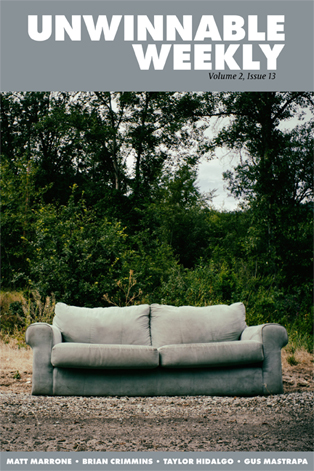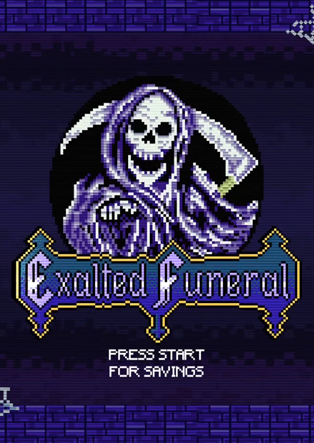
Back to the Couch
The following is a reprint from Unwinnable Weekly Issue Sixty Five. If you enjoy what you read, please consider purchasing the issue or subscribing.
———
When afternoon transitions to evening, the ambient oranges and blues that paint my walls sink to deeper purples, and I find myself lit only from the front by the unearthly glow of my monitor. There’s a quiet moment of realization and I can feel the monitor’s brightness strain my eyes.
For some game sessions, this can mean looking away from the monitor for the first time in hours. My room, devoid of any life save the occasional errant cat, feels unnaturally still. The quiet emptiness serves as a very stark foil to the bright, loud, vibrant visuals and soundscapes of the game. In the dark evening, flooded with only the waning light of the setting sun, I’m struck by just how empty it is.
With the ubiquity of high speed internet, it seems like gaming is moving steadily away from in-person socialization. The age of couch co-op has quietly taken a backseat to online play and console titles have spent the past generation eschewing split-screen play in favor of online features. As time goes on, the online tools become increasingly more robust and the offline tools march toward disappearing entirely. Gone are the days of busy couches full of spectators and participants, replaced by the jubilant stream of voices through Teamspeak and Skype, haunting the headset speakers.
For me, there is something of a loss there. Not because I feel like gaming is becoming more antisocial, because I think that’s actually less true for modern gaming, but because it’s less personally social. Gaming has exploded with social aspects, between consoles’ ability to natively stream through PlayStation Network and Twitch, the option to automatically upload clips to YouTube, constantly updated online leaderboards, and in-game overlays, there is certainly no shortage of ways to make even single player games social experiences. They are, unfortunately, slightly more impersonal, though. As comforting as the voice of a friend in your ear is, it’s still just their voice. There’s something specific in that disconnect that makes gaming feel different.
While I have seemingly infinite opportunity to bring others into my gaming sessions, I feel I no longer stumble into those of others. I can have an audience watch me play, but something feels missing when I can’t be someone else’s audience. To get to experience a game not just as the player, but also a spectator.
For me, gaming in second person has always been a pleasure to experience. There are games I don’t enjoy, but whose stories I do. I’ve always been fascinated with the Silent Hill series, for example, but I never enjoyed romping around the foggy, haunting town of Silent Hill myself. My nerves wear, my muscles ache and I find myself longing to do nearly anything else. When I finally cede and go away from the mist and madness, I still miss it and want to see where the story goes.
Other times, simply being a part of the audience is itself an interactive experience. Having the option to muse aloud about the potential solutions to a puzzle and actively getting to workshop that puzzle or string of puzzles with the other player is something that is itself very gratifying. A chance to make games more than just me experiences, while also getting to experience the story from a brand new perspective, with new methods, and new approaches to even familiar problems.
And when I’m the player, having the “me” become a “we” makes for its own interesting dynamics. The field of play becomes different, my perspective on the game changes depending on who my audience is. The play itself changes, gaining new dimensions depending on the suggestions that player can make, how their commentary affects my expectations for a scene, and how even flippant commentary can itself change the way a scene translates. If nothing else, simply having another set of eyes in the room changes the way I interpret myself. In a vacuum, we don’t question any aspect of ourselves. They’re just reflexive. With an audience, everything we take for granted comes screaming to the forefront, carrying with it aspects of our consciousness we were previously entirely unaware of.
 For some games, this can feel staunchly embarrassing, but for many, it can also become profoundly illuminating.
For some games, this can feel staunchly embarrassing, but for many, it can also become profoundly illuminating.
For me, I feel like losing access to that second person player also means losing an understanding of myself that I almost can’t consciously get on my own. As if there’s something there that’s just beyond reach, and becoming increasingly more difficult to get back. While I absolutely love experiences like the every-participant-a-player games like Left 4 Dead and Borderlands, they undermine that second person, and it makes games become more individually personal, rather than collectively personable.
Perhaps it’s just nostalgia speaking, but I still feel like I’m missing something whenever I play long, sprawling RPGs by myself. Years ago, there would be a console in the living room, a couch full of audience-participants, and an enduring sense that gaming was something I got to share with everyone, even though I was the only one “playing”. Or also getting to share in another’s experience as they played, and without a speaking a word, I could still be introduced to a whole new perspective, or a whole new story, that I wouldn’t have found nearly the same pleasure in discovering myself. There’s such a sense of loss there, even though there’s nothing wrong with the experience on screen. It’s the experience off screen that feels empty.
It’d be nice to have that opportunity again one day. Full room, lots of laughter when I inevitably do something ridiculous or foolish in-game, and the sense that gaming is something greater than just me.
Instead, I find myself back in my quiet, empty, and dark room. I put my headset back on, get treated to a roar of laughter from a just missed joke on the Skype group call, and get back to gaming. After all, current gaming isn’t all bad.
Still miss the couch, though.
———
Taylor Hidalgo is a freelance writer, editor and enthusiast. You can find more of his work on The Thesaurus Rex, and more of him on Twitter.





